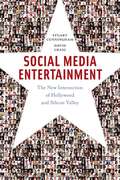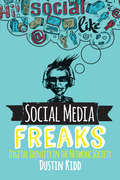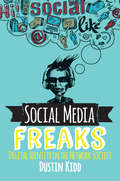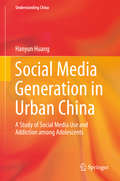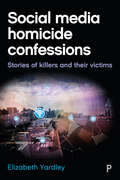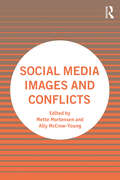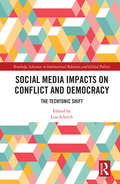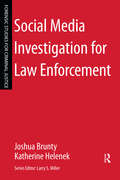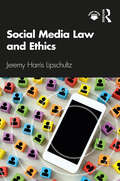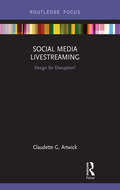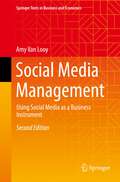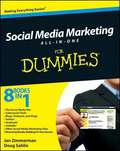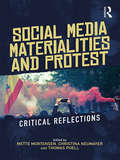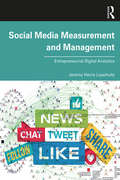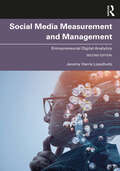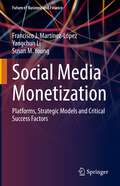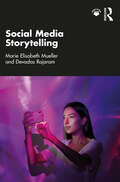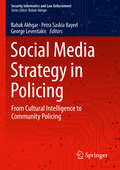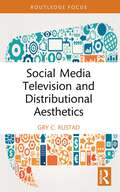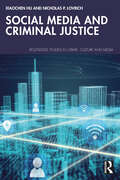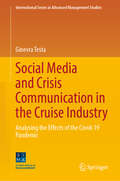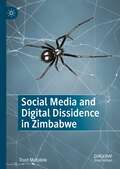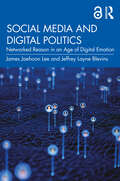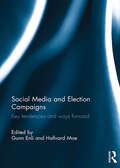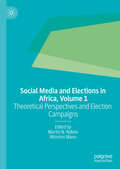- Table View
- List View
Social Media Entertainment: The New Intersection of Hollywood and Silicon Valley (Postmillennial Pop #7)
by Stuart Cunningham David CraigWinner, 2020 Outstanding Book Award, given by the International Communication AssociationHonorable Mention, 2020 Nancy Baym Book Award, given by the Association of Internet ResearchersHow the transformation of social media platforms and user-experience have redefined the entertainment industryIn a little over a decade, competing social media platforms, including YouTube, Facebook, Twitter, Instagram, and Snapchat, have given rise to a new creative industry: social media entertainment. Operating at the intersection of the entertainment and interactivity, communication and content industries, social media entertainment creators have harnessed these platforms to generate new kinds of content separate from the century-long model of intellectual property control in the traditional entertainment industry. Social media entertainment has expanded rapidly and the traditional entertainment industry has been forced to cede significant power and influence to content creators, their fans, and subscribers. Digital platforms have created a natural market for embedded advertising, changing the worlds of marketing and communication in their wake. Combined, these factors have produced new, radically shifting demands on the entertainment industry, posing new challenges for screen regimes, media scholars, industry professionals, content creators, and audiences alike.Stuart Cunningham and David Craig chronicle the rise of social media entertainment and its impact on media consumption and production. A massive, industry-defining study with insight from over 100 industry insiders, Social Media Entertainment explores the latest transformations in the entertainment industry in this time of digital disruption.
Social Media Freaks: Digital Identity in the Network Society
by Dustin KiddSocial media has been transforming American and global cultural life for over a decade. It has flattened the divide between producer and audience found in other forms of culture while also enriching some massive corporations. At the core of Social Media Freaks is the question: Does social media reproduce inequalities or is it a tool for subverting them?Social Media Freaks presents a virtual ethnography of social media, focusing on issues of identity and inequality along five dimensions-race, class, gender, sexuality, and disability. It presents original and secondary findings, while also utilizing social theory to explain the dynamics of social media. It teaches readers how to engage social media as a tool for social activism while also examining the limits of social media's value in the quest for social change.
Social Media Freaks: Digital Identity in the Network Society
by Dustin KiddSocial media has been transforming American and global cultural life for over a decade. It has flattened the divide between producer and audience found in other forms of culture while also enriching some massive corporations. At the core of Social Media Freaks is the question: Does social media reproduce inequalities or is it a tool for subverting them? Social Media Freaks presents a virtual ethnography of social media, focusing on issues of identity and inequality along five dimensions-race, class, gender, sexuality, and disability. It presents original and secondary findings, while also utilizing social theory to explain the dynamics of social media. It teaches readers how to engage social media as a tool for social activism while also examining the limits of social media's value in the quest for social change.
Social Media Generation in Urban China
by Hanyun HuangSocial media such as instant messaging (IM), social networking sites (SNS), blogs and microblogs are an integral part of adolescents' lives in China. Anecdotal evidence reported in the news has suggested that the increasing popularity of social media could make adolescents more vulnerable to being addicted. This exploratory study proposes the concept of "social media addiction" and examines (a) whether social media addiction exists among adolescents in urban China and, if so, who the addicts are, what their symptoms are and to what extent they are addicted; (b) whether sociopsychological traits (e. g. , need for affiliation, impression management, narcissism and leisure boredom) can predict social media addiction among adolescents; (c) what gratifications are obtained by adolescents from their use of social media and whether these gratifications can predict social media addiction and (d) to what degree social media addiction influences adolescents' academic performance and social capital. This study employed quantitative questionnaire surveys among adolescents as the main research method, supplemented by qualitative pre-survey focus groups among adolescents and post-survey in-depth interviews among parents and teachers. Questionnaire surveys were conducted based on a multi-stage cluster sampling of seven middle schools in five urban Chinese cities: Beijing, Shanghai, Guangzhou, Shenzhen and Xiamen. The final sample consisted of 1,549 adolescents, of whom 90% had used social media. Using Young's classic definition of Internet addiction, 15. 6% of participants were classified as social media addicts. The addicted adolescents were often self-absorbed, bored with their leisure time, and good at using manipulation through social media for impression management. Addicts experienced four major social media addiction symptoms: preoccupation, adverse consequences, alleviation of negative emotions and loss of interest in social activities. The seven social media gratifications identified in this study can be categorized into social, information and entertainment gratifications. Among these, entertainment gratifications had the most power to predict social media addiction, while information gratifications were the least likely to lead to addiction. Furthermore, these gratifications were found to be powerful mediators between the adolescents' sociopsychological traits and social media addiction. Finally, the results also indicated that social media addiction and its symptoms had a significant negative impact on adolescents' academic performance and social capital.
Social Media Homicide Confessions: Stories of Killers and their Victims
by Elizabeth YardleyThe relationship between crime and social media has become an increasingly important topic in a networked world. However, the use of social media in relation to violent crime is little understood. This unique book, by an expert in the field, addresses this gap by analysing what those involved in homicide do with social media. Using three international cases in which perpetrators confessed to homicide on social media, it investigates the practices of those involved, providing a groundbreaking conceptual framework of use to criminologists. It argues that such confessions convey important insights not only into the individual offender but also the social and cultural context of contemporary homicide.
Social Media Images and Conflicts
by Mette MortensenThis collection considers how digital images and social media reconfigure the way conflicts are played out, represented and perceived around the globe. Devoted to developing original theoretical frameworks and empirical insights, the volume addresses the role of user images and social media in relation to urgent subjects such as public opinion and emotion, solidarity, evidence and verification, censorship and fake news, which are all central to the ways current conflicts are represented and unfold. Essays include a unique range of case studies from different regional and political contexts (Middle East, Europe, Asia, North America) and in connection with different conflict types (war, terror, riots, everyday resistance, etc.). They also consider performative genres such as memes, selfies and appropriations as well as images conforming to the realism and authenticity of conventional photojournalism. In this way, the collection responds to the challenges of swiftly evolving image genres as well as to the continually shifting policies and algorithms of commercial digital platforms. Together, the essays offer innovative theories and exemplary case studies as a resource for teaching and research in media, journalism and communication programmes. It is also relevant to students, teachers and researchers within sociology, political science, anthropology and related fields.
Social Media Impacts on Conflict and Democracy: The Techtonic Shift (Routledge Advances in International Relations and Global Politics)
by Lisa SchirchSocial media technology is having a dramatic impact on social and political dynamics around the world. The contributors to this book document and illustrate this "techtonic" shift on violent conflict and democratic processes. They present vivid examples and case studies from countries in Africa, South and Southeast Asia, Latin America as well as Northern Ireland. Each author maps an array of peacebuilding solutions to social media threats, including coordinated action by civil society, governments and tech companies to protect human minds, relationships and institutions. Solutions presented include inoculating society with a new digital literacy agenda, designing technology for positive social impacts, and regulating technology to prohibit the worst behaviours. A must-read both for political scientists and policymakers trying to understand the impact of social media, and media studies scholars looking for a global perspective.
Social Media Investigation for Law Enforcement
by Joshua Brunty Katherine HelenekSocial media is becoming an increasingly important—and controversial—investigative source for law enforcement. Social Media Investigation for Law Enforcement provides an overview of the current state of digital forensic investigation of Facebook and other social media networks and the state of the law, touches on hacktivism, and discusses the implications for privacy and other controversial areas. The authors also point to future trends.
Social Media Law and Ethics: Concepts, Practices, Data, Law And Ethics
by Jeremy Harris LipschultzIn this new textbook, social media professor Jeremy Lipschultz introduces students to the study of social media law and ethics, integrating legal concepts and ethical theories. The book explores free expression, as it applies to students, media industry professionals, content creators and audience members. Key issues and practices covered include copyright law, data privacy, revenge porn, defamation, government censorship, social media platform rules, and employer policies. Research techniques are also used to suggest future trends in social media law and ethics. Touching on themes and topics of significant contemporary relevance, this accessible textbook can be used in standalone law and ethics courses, as well as emerging social media courses that are disrupting traditional public relations, advertising and journalism curricula. Case studies, discussion questions, and online resources help students engage with the complexities and ambiguities of this future-oriented area of media law, making it an ideal textbook for students of media law, policy and ethics, mass media, and communication studies.
Social Media Livestreaming: Design for Disruption? (Disruptions)
by Claudette G. ArtwickSocial Media Livestreaming: Design for Disruption? addresses a host of emerging issues concerning social media livestreaming, exploring this technology as a disruption and its potential to shape journalism practice and influence society. Live visual images increasingly inundate our digital screens. While once restricted to broadcast news organizations, "going live" is becoming ubiquitous, fueled by smartphones and social networks. As livestreams and eyewitness video permeate our social media feeds, a wide range of possibilities for journalism and society are unfolding. Using international case studies, interviews with journalists, and survey research with citizens, this book explores major themes including livestreaming’s implications for journalism practice and news content production; citizen activism and participation in democracy; ethical, legal, safety and privacy considerations; and the role of livestreaming in shaping public perception. Social Media Livestreaming: Design for Disruption? is ideal for multiple audiences, from academic researchers to professional journalists and social media practitioners as well as policy-makers and organizations.
Social Media Management: Using Social Media as a Business Instrument (Springer Texts in Business and Economics)
by Amy Van LooyThis is the second edition of the undergraduate textbook 'Social Media Management' which extends the original edition's scope beyond the business angle. The textbook continues with the perspective of organizations - not individuals - and clarifies the impact of social media on their different departments or disciplines, while also exploring how organizations use social media to create business value. To do so, the book pursues a uniquely multi-disciplinary approach by embracing IT, marketing, HR, and many other fields. While the first edition was inspired by the rise of social media tools, the second edition is characterized by a digital economy with increasing digitalization efforts due to newly emerging technologies in Industry 4.0 and the COVID-19 pandemic. Readers will benefit from a comprehensive selection of extended topics, including strategies and business models for social media, influencer marketing, viral campaigns, social CRM, employer branding, e-recruitment, search engine optimization, social mining, sentiment analysis, crowdfunding, and legal and ethical issues. Each chapter starts with one or more teaser questions to arouse the readers’ interest, which will be clarified per topic. The second edition also provides ample self-test materials and reflection exercises.
Social Media Marketing For Dummies®
by Doug Sahlin Jan ZimmermanFace Facebook, link up with LinkedIn, and tweet with Twitter using this all-in-one guide! Marketing your business through social media isn't rocket science. Here's how to apply the marketing savvy you already have to the social media your prospects are using, helping you get and keep more customers, make more sales, and boost your bottom line. Find the business side - explore the variety of social media options and research where your target audience hangs out Collect your tools - discover ways to simplify posting in multiple locations and how to monitor activity Establish your presence - start a blog or podcast to build a following Follow and be followed - find the right people to follow on Twitter and get them to follow you Fan out - showcase your company with a customized Facebook business page Follow up - use analytics to assess the success of your social media campaign Open the book and find: Tips for finding your target market Important legal considerations Step-by-step guidance for setting up a campaign Lots of helpful technology tools Blogging and podcasting advice How to make Twitter pay off for your business Tools for analyzing your success in each medium When to move forward and when to pull back 8 books in 1 The Social Media Mix Cybersocial Tools Blogs, Podcasts, and Vlogs Twitter Facebook LinkedIn Other Social Media Marketing Sites Measuring Results; Building On Your Success
Social Media Materialities and Protest: Critical Reflections
by Thomas Poell Mette Mortensen Christina NeumayerFar from being neutral, social media platforms – such as Facebook, Twitter, YouTube, and WeChat – possess their own material characteristics, which shape how people engage, protest, resist, and struggle. This innovative collection advances the notion of social media materialities to draw attention to the ways in which the wires and silicon, data streams and algorithms, user and programming interfaces, business models and terms of service steer contentious practices and, inversely, how technologies and economic models are handled and performed by users. The key question is how the tension between social media’s techno-commercial infrastructures and activist agency plays out in protest. Addressing this, the volume goes beyond singular empirical examples and focuses on the characteristics of protest and social media materialities, offering further conceptualizations and guidance for this emerging field of research. The various contributions explore a wide variety of activist projects, protests, and regions, ranging from Occupy in the USA to environmental protests in China, and from the Mexican Barrio Nómada to the Copenhagen-based activist television channel TV Stop (1987–2005).
Social Media Measurement and Management: Entrepreneurial Digital Analytics
by Jeremy Harris LipschultzThis new textbook applies a critical and practical lens to the world of social media analytics. Author Jeremy Harris Lipschultz explores the foundations of digital data, strategic tools, and best practices in an accessible volume for students and practitioners of social media communication. The book expands upon entrepreneurship, marketing, and technological principles, demonstrating how raising awareness, sparking engagement, and producing business outcomes all require emphasis on customers, employees, and other stakeholders within paid, earned, social, and owned media. It also looks to the future, examining how the movement toward artificial intelligence and machine learning raises new legal and ethical issues in effective management of social media data. Additionally, the book offers a solid grounding in the principles of social media measurement itself, teaching the strategies and techniques that enable effective analysis. A perfect primer for this developing industry, Social Media Measurement: Entrepreneurial Digital Analytics is ideal for students, scholars, and practitioners of digital media seeking to hone their skills and expand their bank of tools and resources. It features theoretical and practical advice, a comprehensive glossary of key terms, and case studies from key industry thought leaders.
Social Media Measurement and Management: Entrepreneurial Digital Analytics
by Jeremy Harris LipschultzThis revised and updated textbook applies a critical and practical lens to the world of social media analytics. Author Jeremy Harris Lipschultz explores the foundations of digital data, strategic tools, and best practices in an accessible volume for students and practitioners of social media communication.This second edition expands upon entrepreneurship, marketing, and technological principles, demonstrating how raising awareness, sparking engagement, and producing business outcomes all require emphasis on customers, employees, and other stakeholders within paid, earned, social, and owned media. It also looks to the future, examining how the movement toward artificial intelligence and machine learning raises new legal and ethical issues in effective management of social media data. Additionally, the book offers a solid grounding in the principles of social media measurement itself, teaching the strategies and techniques that enable effective analysis. It features theoretical and practical advice, a comprehensive glossary of key terms, and case studies from academic and industry thought leaders.A perfect primer for this developing industry, this book is ideal for students, scholars, and practitioners of digital media seeking to hone their skills and expand their bank of new tools and resources.
Social Media Monetization: Platforms, Strategic Models and Critical Success Factors (Future of Business and Finance)
by Francisco J. Martínez-López Yangchun Li Susan M. YoungSocial media initiatives, when effectively used and correctly monetized, can engage customers better and provide higher ROI rates than traditional marketing and sales initiatives. This book presents a selection of monetization strategies that can help companies benefit from social media initiatives and overcome the current challenges in connection with generating and growing revenues. Using cases and examples covering several social media platforms, the authors describe a variety of strategies and holistic solutions for companies. In addition, the book highlights the latest social media innovations, best business practices, successful monetization cases, and strategic trends in future social media monetization.Top executives need to read this book to have a big picture of corporate-wide “social strategy,” form a “social mindset,” and infuse a “social gene” into their company’s culture, strategy, and business processes. Armed with these social elements, companies can gain confidence, effectively introduce social media tools, and invest in major social media initiatives. Due to changing consumer behavior, social media is also ideal for building and sustaining quality relationships with customers – which is why it is becoming an indispensable element in today’s business.
Social Media Storytelling
by Marie Elisabeth Mueller Devadas RajaramOffering a radical new toolbox for digital storytellers, this key text contains everything today’s media practitioners need to know about conceptualising, editing and producing stories for online platforms and audiences. This book teaches readers practical skills for increasing their reach online, strengthening their personal brand and improving follower counts across the social web, including main platforms such as Twitter, Snapchat, TikTok, Instagram and Facebook. Encouraging a DIY approach, the authors guide readers through various platforms and reveal which are best suited to their users and how to customise stories for different channels. Topics covered include storytelling with smartphones (iOS and Android), storyboarding, framing, sequencing, shooting and editing high-quality content, and evaluating the success of content and campaigns. Contributions from five industry experts expand on privacy, community building and collaboration. The book concludes by looking to the future of social media storytelling, with industry professionals offering predictions for trends to watch out for. Social Media Storytelling is an essential resource for students of mobile and multimedia journalism, digital media and media marketing, as well as for professionals who want to learn how to create compelling content and tell impactful brand stories. The book also features accompanying online exercises.
Social Media Strategy in Policing: From Cultural Intelligence to Community Policing (Security Informatics and Law Enforcement)
by Babak Akhgar Petra Saskia Bayerl George LeventakisThis book addresses conceptual and practical issues pertinent to the creation and realization of social media strategies within law enforcement agencies. The book provides readers with practical methods, frameworks, and structures for understanding social media discourses within the operational remit of police forces and first responders in communities and areas of concern. This title - bridging the gap in social media and policing literature - explores and explains the role social media can play as a communication, investigation, and direct engagement tool. It is authored by a rich mix of global contributors from across the landscape of academia, policing and experts in government policy and private industry. Presents an applied look into social media strategies within law enforcement;Explores the latest developments in social media as it relates to community policing and cultural intelligence; Includes contributions and case studies from global leaders in academia, industry, and government.
Social Media Television and Distributional Aesthetics (Routledge Focus on Television Studies)
by Gry C. RustadSocial Media Television and Distributional Aesthetics explores this distinct fictional form that merges the genres, structures and affordances of television with those of social media and what it entails for contemporary television and media culture and for our experience of new and old media in everyday life.Centred around five key case studies – Skam, Lik meg, Dead Girls Detective Agency, Content and Eva.Stories – this book offers insight into how different social media platforms facilitate distinct aesthetics and content; transnational aspects of social media television; and how different production cultures and industries operate in its production. This analysis extrapolated out into broader principles and theoretical arguments that will help scholars working on a wide variety of questions of television and social media, digitalization, technology, convergence, media aesthetics, production cultures, audience cultures and globalization in the future. Developing new theoretical perspectives to understand what social media television is and can be and creating new methodological frameworks to analyze television and new media as an aesthetic experience, the author proposes distributional aesthetic as the main analytical framework arguing that distribution can be understood as an aesthetic form defined as a situated aesthetic experience in time and space.This book will be relevant for scholars, instructors, students and practitioners working within television studies, social media studies, media aesthetics, and visual and digital culture.
Social Media and Criminal Justice (Routledge Studies in Crime, Culture and Media)
by Nicholas P. Lovrich Xiaochen HuDiscussing social media-related scholarship found in criminology, legal studies, policing, courts, corrections, victimization, and crime prevention, this book presents the current state of our knowledge on the impact of social media and the major sociological frameworks employed to study the U.S. justice system.Building a theoretical framework for the study of social media and criminal justice in each chapter, the chapters provide a systematic reflection of extant research on social media in cybercrime, operations of courts, administration of institutional and community corrections, law enforcement, and crime prevention. The book fills the gap between the contemporary state of knowledge regarding social media and criminal justice with respect to both empirical evidence and types of sociological frameworks being employed to explore and identify the societal costs and benefits of our growing dependence upon social media. In addition to providing an up-to-date overview of our current state of knowledge, this book highlights important areas of future research, wherein the benefits of social media can be expanded and the negative aspects of its broadening use can be minimized.Social Media and Criminal Justice will be of interest to students, scholars and practitioners in the areas of judicial administration, corrections management, law enforcement, and criminal justice-engaged community-based nonprofit organizations involved in court-referred treatment and/or active collaboration with local law enforcement agencies.
Social Media and Crisis Communication in the Cruise Industry: Analysing the Effects of the Covid-19 Pandemic (International Series in Advanced Management Studies)
by Ginevra TestaThis academic monograph examines the crisis communication response strategies employed by the cruise industry on social media following the COVID-19 pandemic. Focusing on social media platform X, the author conducted a content analysis of the top three cruise lines' strategies using NVivo software and assessed public sentiment and emotions through comments using KNIME and R software. The findings identify the most effective strategies for generating positive public sentiment and favourable emotions, contributing to faster business recovery. The book enhances Situational Crisis Communication Theory and offers practical guidance for managers to improve crisis resilience in the face of crises of such magnitude and duration. This work uniquely combines corporate and consumer perspectives to assess the effectiveness of crisis communication.
Social Media and Digital Dissidence in Zimbabwe
by Trust MatsileleThis book proposes a new theorisation when studying cyber dissidents in an African digital sphere. It argues that social media dissidents are a recent development in a long lineage of dissidents in African societies. Using Zimbabwe as a case study, the study locates contemporary dissidents in the same family with other historical dissident figures found in African orature, the Chimurenga wars, through music, poetry and other forms of expression. The book argues against techno-deterministic approaches to studying social media-born digital dissidence in Africa. It is aimed at scholars dedicated to studying social media movements in African contexts and the global south generally, prompting them to re-evaluate their earlier conclusions and adopt a more nuanced and contextspecific approach.
Social Media and Digital Politics: Networked Reason in an Age of Digital Emotion
by James Jaehoon Lee Jeffrey Layne BlevinsInformed by critical theory, this book employs Social Network Analysis (SNA) to examine the ever-increasing impact that social media has on politics and contemporary civic discourse.In just the past decade, social media platforms have been at the forefront of political discord that played out in the January 6th insurrection, the expulsion of a US President from major social media platforms, the attempted regulation of social media in various states, and the takeover of Twitter (now “X”) by one of the richest and (arguably) most financially influential persons in the world. This book examines these phenomena through a comprehensive and in-depth exploration of their meaning and implication for democratic society. Informed by SNA, James Jaehoon Lee and Jeffrey Layne Blevins examine several types of social and political commentary on one of the most influential social media networks and argue that the use of emotional appeals in these posts about social and political topics degrades the quality of civic discourse and encourages the abandonment of reasoning in democratic self-governance.A timely and vital text for upper-level students and scholars in a variety of disciplines from media and communication studies, journalism, and digital humanities to social network analysis, political science, and sociology.The Open Access version of this book, available at http://www.taylorfrancis.com, has been made available under a Creative Commons Attribution-Non Commercial-No Derivatives (CC-BY-NC-ND) 4.0 license.
Social Media and Election Campaigns: Key Tendencies and Ways Forward
by Gunn Enli and Hallvard MoeThis book aims to further the research in the fields of social media and political communication by moving beyond the hype and avoiding the most eye-catching and spectacular cases. It looks at stable democracies without current political turmoil, small countries as well as large continents, and minor political parties as well as major ones. Investigating emerging practices in the United States, Europe, and Australia, both on national and local levels, enables us to grasp contemporary tendencies across different regions and countries.The book provides empirical insights into the diverse uses of different social media for political communication in different societies. Contributors look at the ways in which novel arenas connect with other channels for political communication, and how politicians as well as citizens in general use social media services. Presenting state-of-the-art methodological approaches, drawing on a combination of qualitative and quantitative analyses, the book brings together an interdisciplinary group of researchers in order to address emerging practices of the mediation of politics, campaign communication, and issues of citizenship and democracy as expressed on social media platforms.This book was originally published as a special issue of Information, Communication & Society.
Social Media and Elections in Africa, Volume 1: Theoretical Perspectives and Election Campaigns
by Winston Mano Martin N. NdlelaThis book brings together fresh evidence and new theoretical frameworks in a unique analysis of the increasing role of social media in political campaigns and electoral processes across Africa. Supported by contemporary and historical cases studies, it engages with the main drives behind the various appropriations of social media for election campaigns, organization, and voter mobilization. Contributors in this volume delve into changing and complex aspects of social media, offering an appraisal of theoretical perspectives and examining fascinating case studies which social media use is redefining elections across Africa. Contributions show that new media ecologies are resulting in new policy regimes, user behaviors, and communication models that have implications for electoral processes. The book also provides preliminary analysis of emerging forms of algorithm-driven campaigns, fake news, information distortions and other methods that undermine electoral democracy in Africa.
